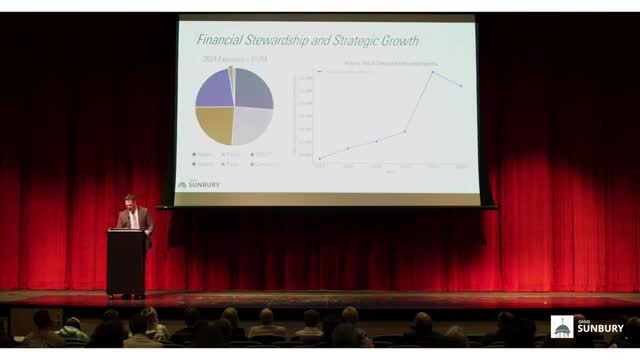Mayor outlines sidewalk inventory, impact-fee policy and grant totals in State of the City
Get AI-powered insights, summaries, and transcripts
Subscribe
Summary
Mayor Joe St. John summarized a city sidewalk inventory, explained impact fees as a growth-pay principle, and said Sunbury secured $2.3 million in grants in 2024 and expects $6.8 million in 2025.
Mayor Joe St. John highlighted data-driven planning steps including a comprehensive sidewalk assessment and a restatement of the city’s impact-fee policy, and he summarized recent grant awards.
Sidewalk assessment: The mayor said intern Grant Colson evaluated more than 1,000 sidewalk panels and walked 32 miles of sidewalks with GPS tagging. St. John reported the assessment found nearly 99,000 feet of sidewalk in good condition and approximately 73,000 feet of missing or unserviceable sidewalk (about 32 miles of gaps). The report assigned priority ratings, identified ADA-noncompliant segments, produced cost estimates for repairs and replacements, and recommended multiuse trails as alternatives to fill connectivity gaps.
Impact fees and budget allocation: The mayor revisited the city’s impact-fee approach, saying those fees are charged to new development so that growth pays for growth. He stated impact fees can fund new facilities, parkland acquisition, roads, turn lanes and intersections but cannot fund staff salaries, routine maintenance or day-to-day operations. He said core budget categories — administration, police, wastewater treatment and streets — each account for roughly 22 to 26 percent of the general fund while cemetery maintenance and parks and recreation each make up about 2 percent.
Grants and budget context: St. John said Sunbury secured $2,300,000 of grants in 2024, which he said represented over 20 percent of the city’s $12,000,000 general budget. He said the city is set to receive $6,800,000 in grants in 2025, which he characterized as more than half of the general budget. The mayor described grant success as tied to clear projects, a strong local match and active partnerships with county, state and federal partners.
The mayor framed these items as part of a broader “Growth Must Pay for Growth” strategy and said the sidewalk report will serve as a foundation for infrastructure planning. He did not present an ordinance or new fee schedule during the address.
